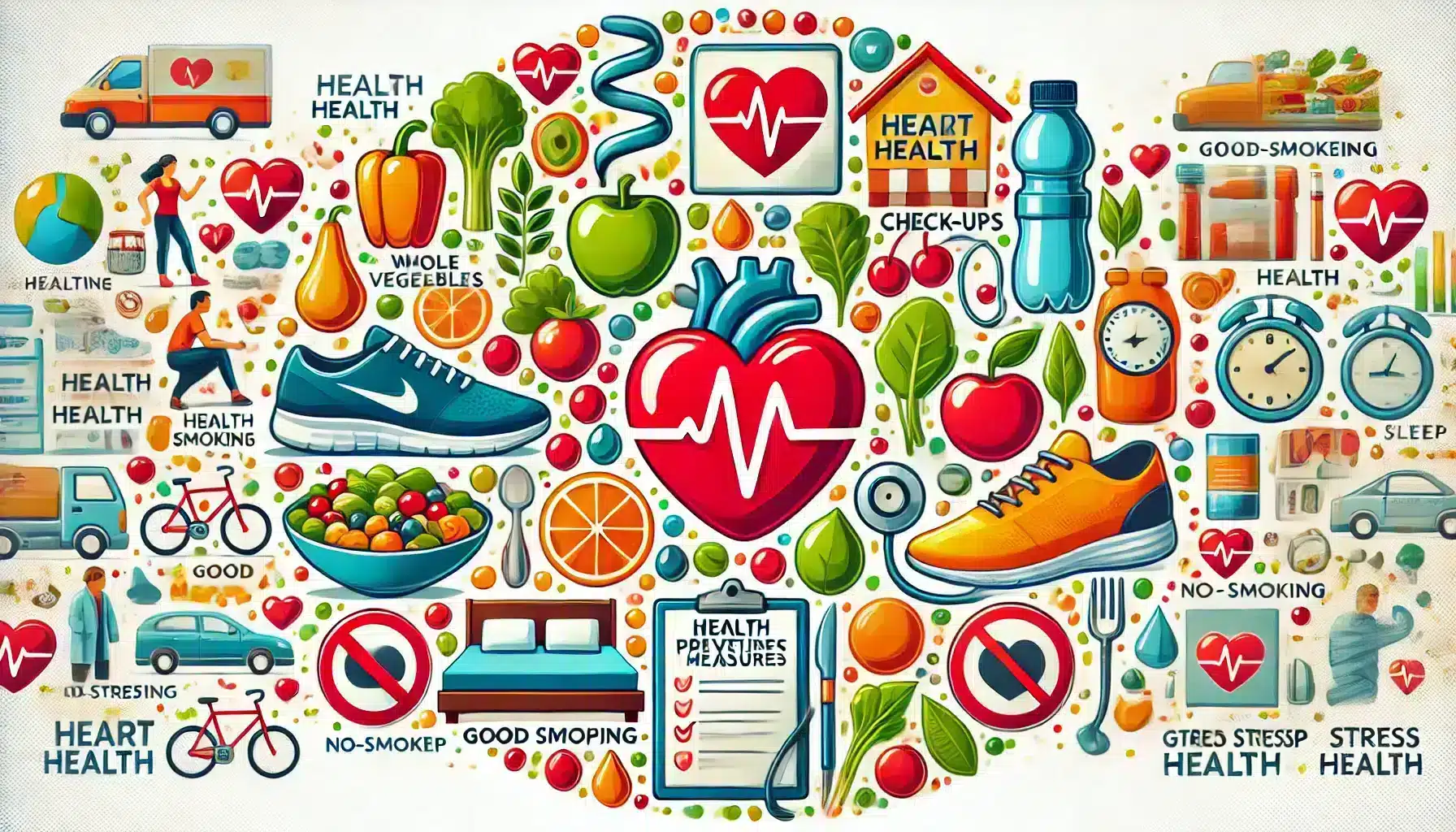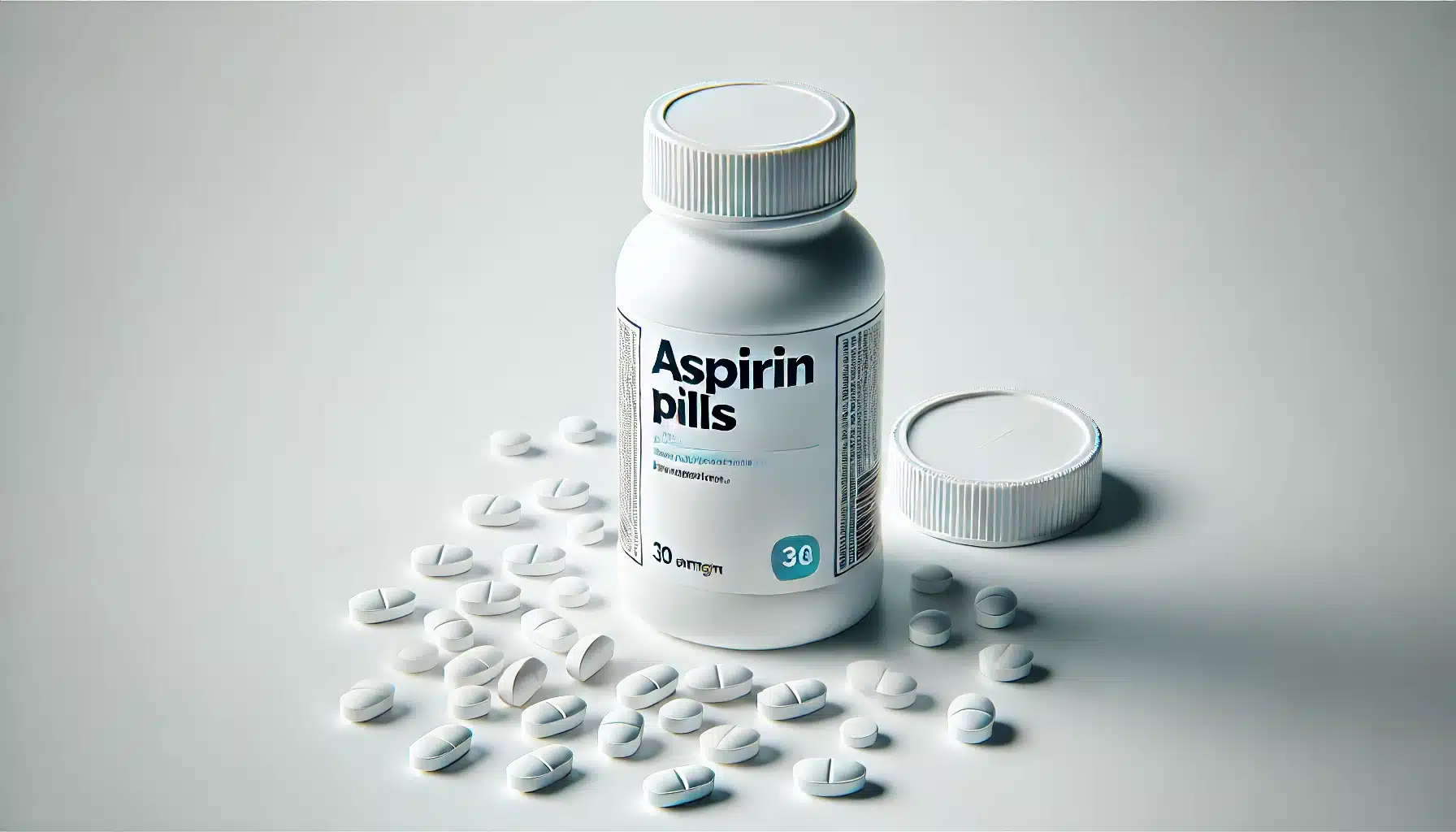Understanding Cholesterol: What It Is and How It Affects Heart Health
To manage cholesterol for better heart health, it is essential to first understand what cholesterol is and how it plays a role in your cardiovascular system. Cholesterol is a type of fat, or lipid, found in your blood. Although it is often viewed negatively, cholesterol is necessary for building cells, producing certain hormones, and helping with other bodily functions.
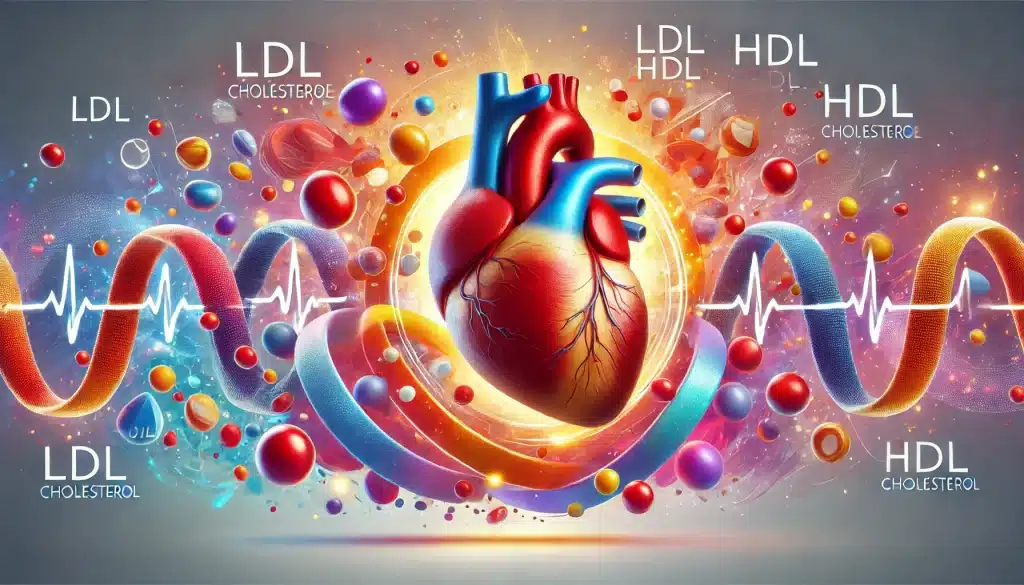
There are two main types of cholesterol in the body: low-density lipoprotein (LDL) and high-density lipoprotein (HDL). LDL, often called “bad” cholesterol, contributes to plaque buildup in the arteries, increasing the risk of heart-related diseases. HDL, or “good” cholesterol, helps remove LDL from the bloodstream, providing a protective effect on heart health. Maintaining a balance between these types is critical to manage cholesterol effectively for improved cardiovascular wellness.
- LDL (Bad Cholesterol): Contributes to artery blockage, increasing heart disease risk.
- HDL (Good Cholesterol): Aids in removing LDL from the bloodstream, protecting heart health.
Types of Cholesterol: LDL, HDL, and Triglycerides
Understanding the different types of cholesterol is vital when trying to manage cholesterol for better heart health. Aside from LDL and HDL, triglycerides are another fat found in the blood that contributes to heart risk when elevated. High triglyceride levels, especially when combined with high LDL or low HDL, can significantly heighten the likelihood of cardiovascular disease.
- Triglycerides: Formed from unused calories and stored as fat in the body; high levels raise heart health risks.
Why Cholesterol Levels Matter for Heart Health
Keeping cholesterol levels within a healthy range is essential to prevent heart-related issues. Elevated LDL cholesterol can result in plaque accumulation in the arteries, causing them to narrow and harden—a condition known as atherosclerosis. This buildup restricts blood flow, making the heart work harder, and increasing the risk of heart attack, stroke, and high blood pressure.
Thus, managing cholesterol for better heart health is a proactive step towards reducing the chances of cardiovascular complications. By keeping LDL levels low and HDL levels optimal, you support the efficient circulation of blood and lower the burden on your heart.
Causes of High Cholesterol Levels
Several factors contribute to high cholesterol levels, some of which are within your control, while others are not. To effectively manage cholesterol for better heart health, understanding these causes can guide lifestyle and medical choices that reduce your overall risk.
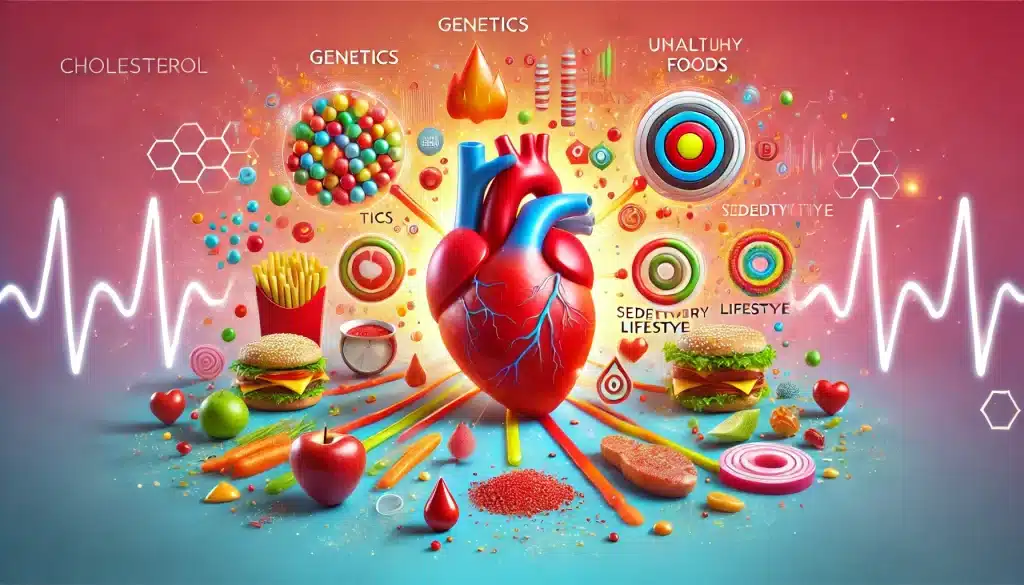
Genetic Factors and Family History
Genetics play a significant role in cholesterol levels. Some individuals inherit conditions, such as familial hypercholesterolemia, which leads to high cholesterol levels regardless of diet or lifestyle. If high cholesterol runs in your family, it is crucial to take steps to actively manage cholesterol levels for improved heart health.
Lifestyle and Dietary Choices
Poor dietary habits, such as consuming foods high in saturated and trans fats, can lead to elevated LDL levels. Sedentary lifestyles also contribute to lower HDL levels, impacting heart health. Engaging in healthy dietary practices and regular physical activity can help manage cholesterol for better heart health.
- Avoid foods high in saturated fats and trans fats, such as processed snacks, fried foods, and red meats.
- Incorporate more fiber-rich foods like fruits, vegetables, and whole grains into your diet.
Medications and Other Health Conditions
Certain health conditions, including diabetes and hypothyroidism, can impact cholesterol levels. Medications for these and other conditions may also affect cholesterol. Working with a healthcare provider to address these issues is essential to effectively manage cholesterol for better heart health.
The Dangers of High Cholesterol for Heart Health
High cholesterol levels, particularly elevated LDL, pose serious risks to heart health. When left unmanaged, high cholesterol can lead to atherosclerosis, a condition characterized by plaque buildup in the arteries. This plaque buildup can restrict or block blood flow, increasing the risk of heart attack and stroke. By proactively working to manage cholesterol for better heart health, you can prevent these dangerous outcomes and protect your cardiovascular system.
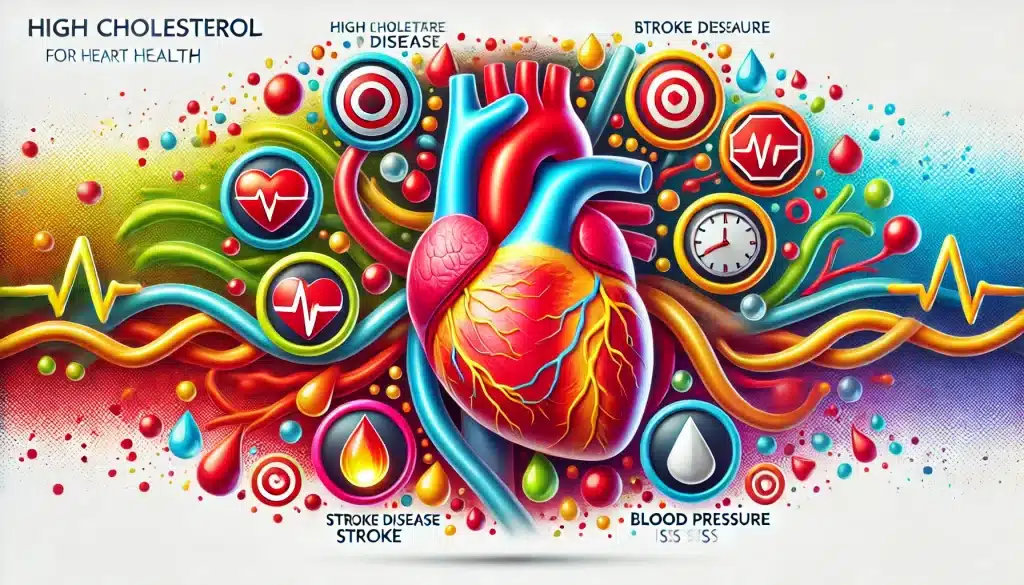
Risk of Heart Disease
The connection between high cholesterol and heart disease is well-established. LDL cholesterol, when excessive, accumulates along arterial walls, causing hardening and narrowing. This restricts blood flow, making it more difficult for the heart to supply blood to other organs. Effective cholesterol management reduces the risk of heart disease and helps promote better heart health.
Connection to Stroke and Blood Pressure Issues
Stroke is another severe consequence of high cholesterol, as blocked arteries can impede blood flow to the brain. Additionally, high cholesterol contributes to high blood pressure, as narrowed arteries require the heart to exert more force to pump blood. Managing cholesterol levels is crucial in lowering both stroke risk and blood pressure complications.
How Cholesterol Builds Up in Arteries
The buildup of cholesterol in arteries, known as plaque, starts when LDL cholesterol enters the artery walls. Over time, this leads to inflammation, attracting white blood cells that attempt to clear the LDL, resulting in further buildup. This process emphasizes the importance of managing cholesterol for better heart health, as unchecked plaque accumulation can lead to life-threatening cardiovascular conditions.
How to Manage Cholesterol Levels for Better Heart Health
Maintaining healthy cholesterol levels is a multi-faceted process that involves diet, exercise, and sometimes medication. By adopting these strategies, you can actively manage cholesterol for better heart health and prevent future complications. Let’s explore some practical steps to take control of your cholesterol levels.

Adopting a Heart-Healthy Diet
Diet plays a central role in cholesterol management. A heart-healthy diet focuses on consuming foods that naturally lower LDL levels and raise HDL. By being mindful of your food choices, you can significantly improve your cholesterol profile.
Foods to Include
- Fruits and Vegetables: Packed with fiber, antioxidants, and nutrients that support heart health.
- Whole Grains: Oats, barley, and other whole grains help reduce LDL cholesterol levels.
- Fatty Fish: Salmon, trout, and mackerel contain omega-3 fatty acids that boost HDL cholesterol.
- Nuts and Seeds: Almonds, walnuts, and chia seeds are beneficial for heart health and managing cholesterol.
Foods to Avoid
- Red and Processed Meats: High in saturated fats that can increase LDL cholesterol.
- Fried and Processed Foods: Often contain trans fats that negatively impact cholesterol levels.
- High-Sugar Foods: Excessive sugar can lead to weight gain and elevated LDL cholesterol.
Importance of Regular Exercise
Physical activity is crucial to manage cholesterol for better heart health. Regular exercise not only helps reduce LDL cholesterol but also increases HDL, promoting better heart function and circulation.
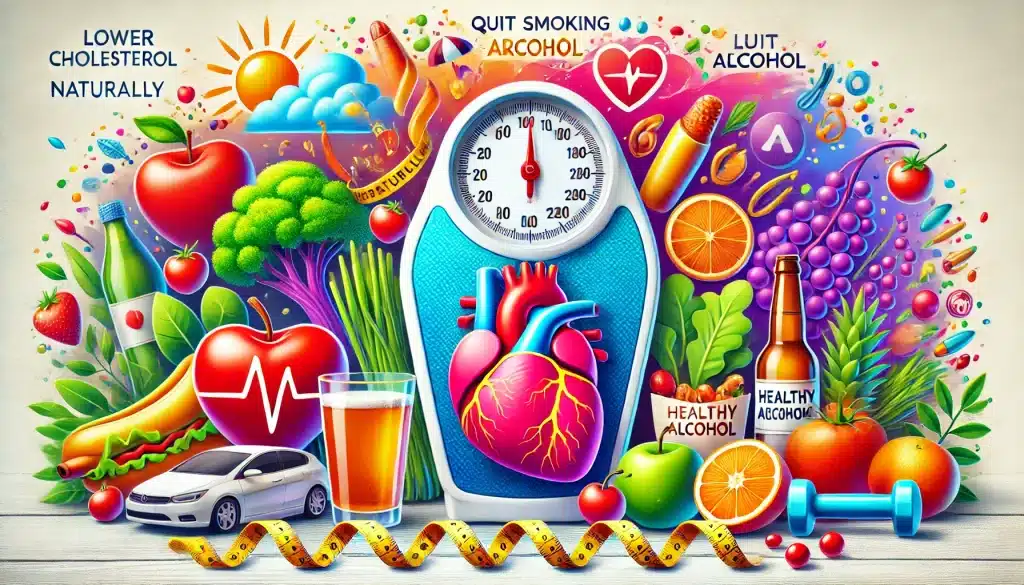
Types of Exercise for Cholesterol Management
- Aerobic Exercise: Activities like walking, jogging, and cycling help lower LDL cholesterol.
- Strength Training: Supports weight management and boosts HDL levels.
- Flexibility and Balance Exercises: Yoga and stretching can aid in stress management, indirectly supporting heart health.
Role of Medication and Supplements
In cases where lifestyle changes alone are insufficient, medication may be necessary to effectively manage cholesterol for better heart health. Common medications include statins, which lower LDL, and niacin, which can raise HDL levels. Consult with a healthcare provider for personalized recommendations.
Stress Management Techniques
Chronic stress contributes to high cholesterol levels, so stress management is essential for heart health. Incorporating practices like meditation, deep breathing exercises, and spending time in nature can lower stress levels and promote better heart health.
Lifestyle Changes to Lower Cholesterol Naturally
Beyond diet and exercise, certain lifestyle changes can further support cholesterol management. By making these adjustments, you empower yourself to maintain better cholesterol levels naturally.
Quitting Smoking and Limiting Alcohol
Smoking is known to decrease HDL cholesterol, while excessive alcohol intake can lead to high triglycerides. Quitting smoking and moderating alcohol consumption can effectively help manage cholesterol for better heart health.
Healthy Weight Management
Maintaining a healthy weight plays a vital role in cholesterol control. Excess weight, especially around the abdomen, is linked to high LDL and low HDL levels. By focusing on a balanced diet and regular exercise, you can achieve a weight that supports optimal cholesterol levels.
Monitoring Cholesterol Levels: Tests and Frequency
To effectively manage cholesterol for better heart health, regular monitoring is essential. By keeping track of your cholesterol levels, you can make timely adjustments to your lifestyle or medication regimen as needed. Let’s explore the different types of cholesterol tests and the recommended frequency for checking your levels.
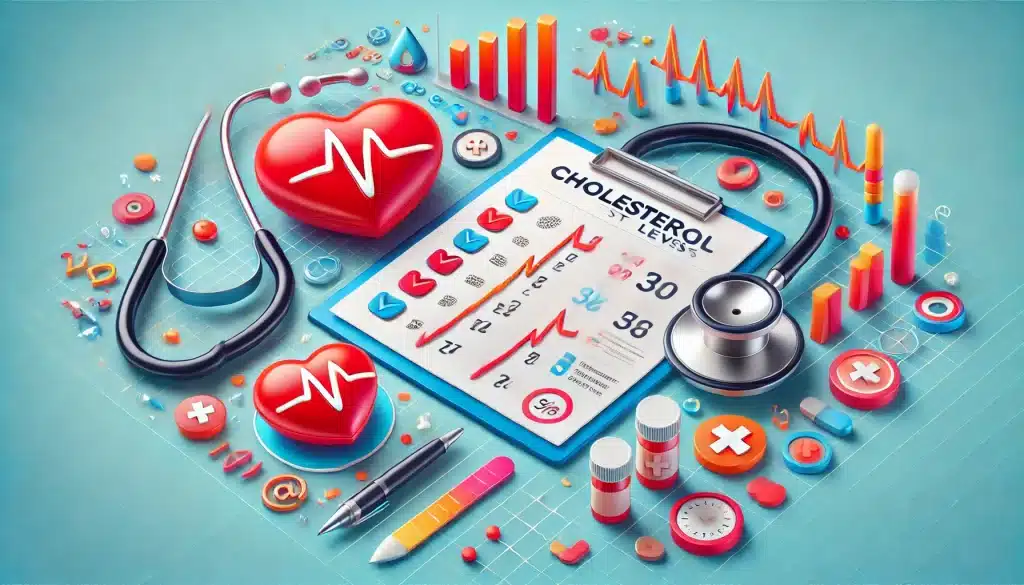
Types of Cholesterol Tests
Cholesterol testing typically involves a blood test called a lipid panel, which measures levels of LDL, HDL, and triglycerides. This information helps determine your overall risk for heart disease. Here are the primary components measured:
- Total Cholesterol: The combined amount of LDL, HDL, and other lipid components in your blood.
- LDL Cholesterol: The “bad” cholesterol that can lead to plaque buildup in the arteries.
- HDL Cholesterol: The “good” cholesterol that helps remove LDL from your bloodstream.
- Triglycerides: A type of fat stored in the body; high levels can increase heart disease risk.
How Often Should You Test?
The frequency of cholesterol testing depends on your age, risk factors, and overall health. For those with no prior history of high cholesterol or heart disease, testing every 4-6 years may be sufficient. However, individuals with known high cholesterol, a family history of heart disease, or other risk factors should consider more frequent testing to manage cholesterol for better heart health.
It is generally recommended to discuss testing frequency with a healthcare provider, who can advise on the best schedule based on your personal health profile.
FAQ: Frequently Asked Questions on Cholesterol and Heart Health
How Quickly Can Lifestyle Changes Affect Cholesterol?
Implementing lifestyle changes, such as improving diet and increasing physical activity, can lead to measurable cholesterol changes within a few weeks to months. However, the exact timeline varies depending on individual health factors and consistency. For many, these adjustments are a long-term commitment to manage cholesterol for better heart health.
Can High Cholesterol Levels Be Reversed?
While lifestyle changes and medications can significantly lower cholesterol levels, “reversing” high cholesterol depends on various factors, including genetics and severity. Some individuals may achieve optimal levels through lifestyle changes alone, while others may require lifelong medication to keep cholesterol under control.
What Are the Best Foods to Lower Cholesterol?
Foods rich in fiber, such as oats, beans, and many fruits, are particularly effective in lowering LDL cholesterol. Additionally, fatty fish, nuts, and olive oil are excellent choices for those looking to manage cholesterol for better heart health. Avoiding foods high in trans fats and saturated fats is equally important in maintaining a heart-healthy diet.


